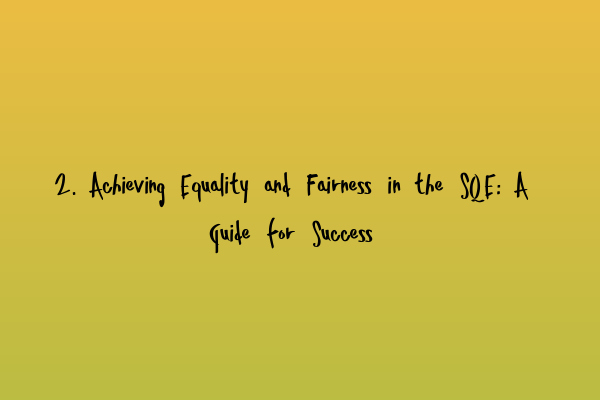Achieving Equality and Fairness in the SQE: A Guide for Success
Welcome to our comprehensive guide on achieving equality and fairness in the Solicitors Qualifying Examination (SQE). As a solicitor, it is crucial to understand the importance of equality and fairness in the legal profession. In this blog post, we will explore how you can navigate the SQE while upholding these essential principles.
The SQE and its Importance
The SQE is a new assessment that has been introduced to ensure consistency and set high standards for qualifying solicitors in England and Wales. It is designed to assess the skills, knowledge, and competencies required to practice law effectively.
In order to excel in the SQE, it is not enough to simply possess legal expertise. It is equally important to embrace and promote equality and fairness in all aspects of the examination and beyond.
Understanding Equality and Fairness
Equality refers to the principle of treating every individual fairly and without discrimination or bias. It ensures that all candidates have an equal opportunity to succeed in the SQE, regardless of their background or personal circumstances.
Fairness goes hand in hand with equality. It means that the SQE should be conducted in a manner that is just and transparent, with no undue advantage given to any particular candidate. Fairness ensures that all candidates are assessed on their merit and abilities.
Tackling Bias and Discrimination
In order to achieve equality and fairness in the SQE, it is crucial to address and eliminate any forms of bias and discrimination. This will ensure that all candidates are assessed solely on their abilities and not on factors that are irrelevant to their legal competence.
Training providers and examiners should undergo comprehensive training to prevent unconscious biases from influencing their judgments. The examination process should also be constantly monitored and reviewed to identify and rectify any potential biases that may arise.
Providing Support and Accessible Resources
All candidates should have access to support and resources that will enable them to prepare for the SQE effectively. This includes providing accessible study materials, practice exams, and guidance on exam techniques. By providing equal access to resources, we can level the playing field and ensure that each candidate has an equal chance to succeed.
Furthermore, it is important to create an inclusive environment where candidates from diverse backgrounds feel welcome and valued. This can be achieved by promoting diversity within the legal profession and fostering a culture of respect and understanding.
Working Towards a More Inclusive SQE
Creating an inclusive and fair SQE requires a collaborative effort from all stakeholders, including candidates, training providers, examiners, and regulatory bodies. Each stakeholder should actively contribute to the promotion and practice of equality and fairness.
Regulatory bodies play a crucial role in setting and enforcing standards that promote equal opportunities for all candidates. They should regularly review and update the SQE to eliminate any potential biases and ensure that it remains a fair and valid assessment of legal competence.
Conclusion
Achieving equality and fairness in the SQE is not just a moral imperative, but also essential for maintaining the integrity of the legal profession. By actively promoting and practicing equality and fairness, we can ensure that the SQE serves as a true measure of legal competence for all aspiring solicitors.
As you prepare for the SQE, remember to prioritize equality and fairness in your approach. Seek out support and resources that are designed to provide equal opportunities to all candidates. Stay informed about any updates or changes to the examination process, and actively advocate for a more inclusive SQE.
By prioritizing equality and fairness in your journey towards becoming a solicitor, you will not only succeed in the SQE but also contribute to a more diverse and equitable legal profession.

Leave a Reply